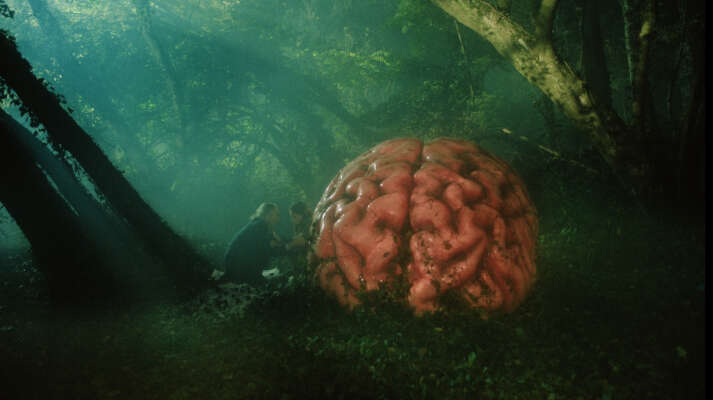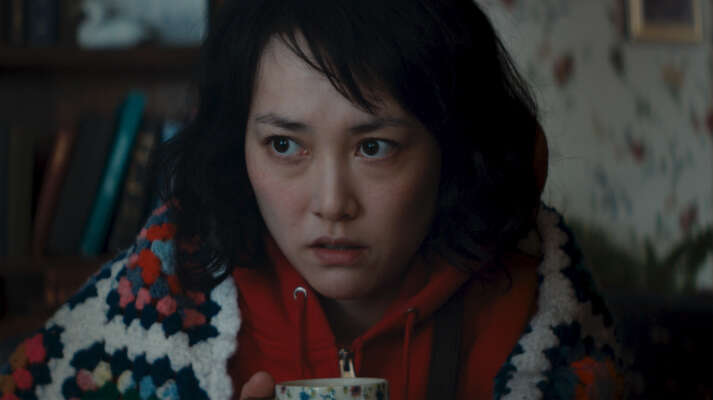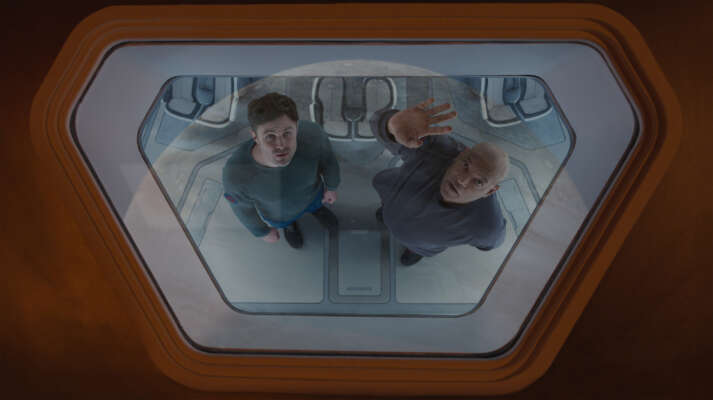The New Dads
From The Pursuit of Happyness to CAPTAIN FANTASTIC
The New Dads
Written by Peter Bowen
CAPTAIN FANTASTIC | A Hero of a Dad
In CAPTAIN FANTASTIC, Ben Cash (Viggo Mortensen) is a dad raising a family of six kids on his own. He and his wife had decided early on that they wanted to bring up their kids differently––educating them on their own, living in the natural beauty of the Pacific Northwest, and letting reason guide their belief system. But when his wife gets ill, Ben shoulders the immense job of keeping them all together by himself. “I’m fascinated by all the issues that revolve around parenting,” Ross says. “Ben has given up the outside world and whatever personal ambitions it held for him to devote his life to being the best father he thinks he can be. The question becomes: is he the best father in the world or the worst? Is what he’s doing insane or insanely great?” For The Associated Press’ Jake Coyle the answer is easy: “Viggo Mortensen plays one of the all-time great movie dads.” In striving to be the best dad that he can be, Mortensen’s character is constantly reassessing when to push his kids and when to protect them. In taking the role, Mortensen, himself a dad, recognized the complex course that Ben has set for himself. “How can you talk about philosophy, science, sex or death with a 7-year-old?” asks Mortensen. “There’s a beautiful openness in this family.” To recognize Ben’s extraordinary journey into fatherhood, we explore five other recent films about being a dad.
The Pursuit of Happyness | Paternal Ambition

In Gabriele Muccino’s 2006 based-on-a-real-story The Pursuit of Happyness, Will Smith plays Chris Gardner, a young father forced into homelessness at the same time he is trying to secure the American dream for his family. Although the film is based on a memoir of the same name, star/producer Will Smith knew he wanted to tell Gardner’s story long before the book had been written. “I first got turned onto Chris Gardner from the 20/20piece [in 2003],” Smith told AskMen.com. “There is a segment where he goes into the actual [public] bathroom that he slept in with his son, and I was like, ‘I'm making that movie’.” Not only did Smith make the movie, but he cast his own son, Jaden––in his first feature film role––to play Gardner’s son. Part rags-to-riches yarn, part paternal melodrama, The Pursuit of Happyness covers a year of Gardner’s life during which his dream to succeed and his desire to be a better dad are in constant collision. In 1981, after several failed economic ventures, Gardner secures an unpaid internship at Dean Witter Reynolds, hoping to beat out the other 20 interns for the prize of a full-time job. But just as his future is about to open up, his present falls apart. First, someone steals the bone density scanner he’s trying to sell, then his wife leaves him, and then he’s arrested for unpaid parking tickets. Homeless, Gardner tries to dress for success at a high-powered brokerage firm by day while scrambling to find a place for his son and him to sleep at night. In true Hollywood fashion, Gardner’s gamble pays off. He not only gets the job, but later becomes a top earner at Bear Stearns & Co., before launching his own investment firm, Gardner Rich & Co., in 1987. But if Gardner’s story has a happy ending, the film never pretends that juggling fatherhood and ambition is ever easy. As Boston Globe critic Ty Burr notes, “I don't think I've seen a mainstream movie get fatherhood so right since Kramer vs. Kramer: the fear, the indulgence, the snappishness, the pre-occupied ‘uh-huhs’ as a child natters about his day, the steamrolling waves of love.” In making the film, Smith was in many ways less interested in exploring Gardner’s financial triumph as he was in the question that his struggle poses for other fathers: “Would I have been man enough, father enough, husband enough to stand up and face the adversity the way that person did, the way Chris Gardner did?” Gardner himself claims his greatest accomplishment was becoming the father he never had. In a 2011 interview with Success magazine, Gardner explains, “I was there for my son, so I know he will be there for his children, breaking the cycle of absentee fathers in our family.” The film proved both a personal and paternal success for Will Smith. He was nominated for an Academy Award for his performance, and his son, Jaden, won the MTV Movie Award for Breakthrough Performance.
The Road | A Father’s Journey

In 2009 John Hillcoat brought to the screen Cormac McCarthy’s Pulitzer Prize-winning novel, The Road, about a father (Viggo Mortensen) and his son (Kodi Smit-McPhee) traveling together in a post-apocalyptic landscape. The world has been reduced to terrifying conditions: no food, no fuel, no secure place to stay, only roads populated with thieves, killers and cannibals. In both the book and film, however, what terrible things have brought about his nightmare are ultimately less interesting than what holds the father and son together. For the author, the harrowing tale began as a love story between father and son. In a special interview, McCarthy described to Oprah how during a trip with son, John, to El Paso he had a vision. As his son slept, McCarthy looked out the window late at night and imagined a different, more horrific world existing outside. While the filmmakers perfectly translated the author’s dystopic vision, they never lost sight of the love at the story’s center. For Mortensen, who engaged in a rigorous weight-loss and training program to transform into the character of Man, the emotional work was all about finding that paternal affection. “The cold, the wet, the hunger ... all that helped us to get to another place. An emotional place,” he told The Kansas City Star. As a dad himself, Mortensen understood deeply his character’s plight. “It's really about protecting your child, no matter what the circumstances,” Mortensen told USA Today. “At its core, it's a love story." For many critics, that love of a father for his son brings light to the horrific world the filmmakers have created. “In this haunting portrait of America as no country for old men or young, Hillcoat — through the artistry of Mortensen and Smit-McPhee — carries the fire of our shared humanity and lets it burn bright and true,” exclaims Rolling Stone’s Peter Travers.

The Descendants | The Land of Our Fathers
In 2007, Alexander Payne and his producing partners optioned Kaui Hart Hemmings’s first novel The Descendants about a wealthy Hawaiian landowner whose life is turned upside down when his wife is put into a coma by a boating accident. Hemming, who grew up in Hawaii with world-class surfer and state senator Fred Hemmings Jr. as her adopted dad, had a deep personal knowledge of her novel’s location. In the story, Matt King (played by George Clooney) traces his roots back to the original missionaries and Hawaiian royalty, a lineage that is now represented by his extensive real estate holdings. When a serious boating accident puts his wife into a coma, King, who’d previously referred to himself as “the understudy” in the family, is forced to take center stage as the lead parent. It is a role for which he quickly discovers himself to be woefully unprepared. He knows very little about the emotional life of his teenage daughter Alexandra (Shailene Woodley) or the younger Scottie (Amara Miller), not to mention the fact that his wife had been cheating on him. In shifting his perspective from real estate to the reality of his family, King is forced to confront his own life and world. In an essay in Time magazine, Touré explains “the challenge of how to be an effective parent in the midst of crisis is at the heart of The Descendants.” But even more it speaks to the plight of fathers being “forced to step up to the primary role?” In confronting his shortcomings (as a father, husband, even a descendant), King is forced to do things differently. “I thought that was beautiful, and it intrigued me: Love when you don’t want to, love when it’s very difficult,” Payne tells PopMatters. “That’s what made me want to do it.” In the film’s narrative arc, King’s journey from being an absentee patriarch to becoming a hands-on dad mirrors his other big transformation from real estate mogul to guardian of his inheritance. For The Philadelphia Inquirer’s Steven Rea, “The Descendants is a story about discovery and self-discovery, about being responsible to one's family - but also being responsible to the place that a family comes from, the ground we walk on, the earth.” Come award season, The Descendants was nominated for five Academy Awards, winning for Best Adapted Screenplay.
A Better Life | The Cost of Being a Father

In Chris Weitz’ 2011 A Better Life, Carlos Galindo (Demián Bichir), an undocumented worker in Los Angeles, discovers the unexpected high costs of trying to create a future for his son, Luis (José Julián). The film was originally penned by Roger Simon in 1989 when he saw the potential for transforming an anecdote about a gardener’s truck being stolen into an updated version of Vittorio De Sica’s 1949 Neo-realist classic The Bicycle Thief. Two decades later Eric Eason rewrote the script, reshaping the story to conform to the changing social and political landscape of Mexican immigrants in LA. In the story, Carlos scrapes together enough money to a buy the truck and tools of the landscape gardener he works for in order to build a business for himself. On his first day owning a business, another immigrant steals his future from him. For the next few days, Carlos and Luis search for the truck everywhere, showcasing the various subcultures of Mexican immigrants as they crisscross Los Angeles. After they steal the truck back, fate intervenes. Carlos is arrested and, after the cops discover him to be undocumented, sent him back to Mexico, leaving Luis fatherless in LA. Although Weitz made a name for himself with comedies, like American Pie, and big Hollywood fantasies, like The Twilight Saga: New Moon, A Better Life felt personal for him. His grandmother, Lupita Tovar, was a Mexican screen actress who’d come to Hollywood at the age of 17 in 1928. And Weitz, with his brother Paul, had explored modern fatherhood (or, at least, father figures) in their 2002 About A Boy. “I do consider there to be a void in popular culture of good fathers. They’re often the butt of fun and you see it especially in TV and comedies,” Weitz told PopMatters. “They’re buffoons. It’s almost as if they’re from a different social class or country than their wives and I’ve always kind of bristled at that representation.” To keep his story as real as possible, Weitz turned to Father Gregory Boyle of Homeboy Industries, an organization run by former gang members, to identify appropriate locations. While A Better Life focuses on the gritty details that connect this father and son, the shadowy political reality that separates them, especially in the way they are essentially from different cultures, is felt throughout the film. “The relationship between father and son rests at times as much on what they don’t say as what they do,” observes The Hollywood Reporter’s Kirk Honeycutt. “The two males are very different from one another and their different upbringings only partly account for this.” For his quiet and mesmerizing performance, Bichir received an Academy Award nomination for Best Actor.
Like Father Like Son | The Heart of Fatherhood

In his 2013 Like Father, Like Son, Japanese master Hirokazu Koreeda uses a plot twist straight out Victorian melodrama to explore what it means to be a father today. Ryota Nonomiya (pop singer-turned-actor Masaharu Fukuyama) has carefully constructed a life that signifies success in modern Japan. He works at a high paying and time-consuming job and lives in a perfectly appointed apartment in a shining glass skyscraper with his beautiful wife and adorable six-year-old son. That is until a phone call from the hospital informs him he is not his son’s father. Recently discovered records reveal that his son was switched at birth with another boy. This impossible predicament is made worse as he gets to know his blood son and the father who has been raising him. While the other dad, Yukari Saiki (Maki Yoko), is a slacker with little money or ambition, his playful affection for his children painfully reminds Ryota how little time, effort and love he has put into being a real dad. As the story evolves, this logistical nightmare forces Ryota to confront the question of what it means to be a father in the first place, a question that personally inspired the filmmaker. “I have a 5 year old child, just like the protagonist in the story, and through making this film I wanted to think about what blood connections really mean,” Koreeda told IndieWire. While the plot set up might seem a tad theatrical, the characters’ emotional twists and turns feels entirely fresh and surprising. For The Independent’s Robbie Collin, “What moved the audience so thoroughly was the film’s utterly clear-eyed exploration of what fatherhood, and its attendant concerns of legacy, bloodlines and "manning up", actually entails.” The film, much like fatherhood itself, ends up with few answers but a lot of acceptance. At the 2013 Cannes Film Festival, Koreeda won both the Jury Prize and the Prize of the Ecumenical Jury for this tale of fatherhood.


